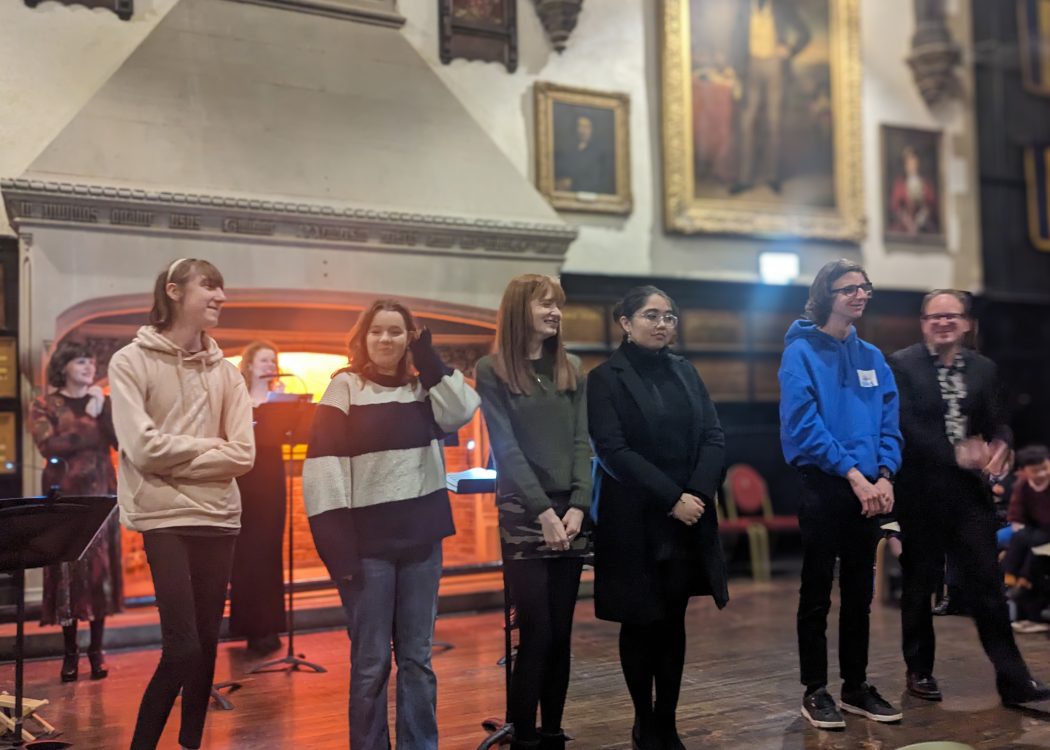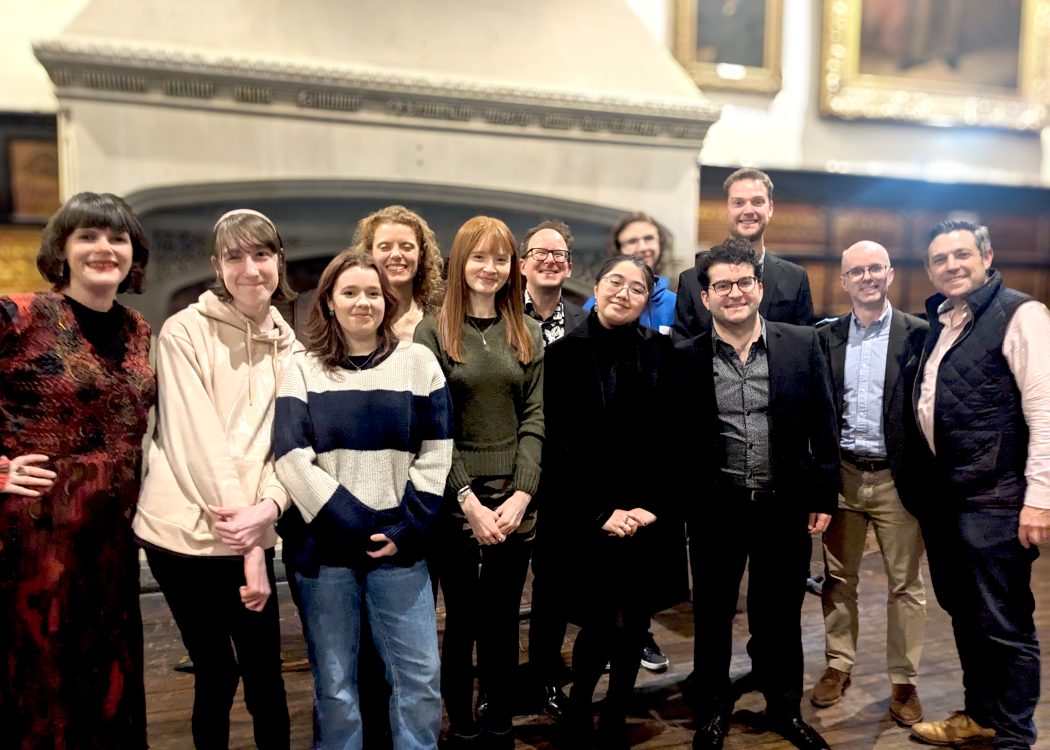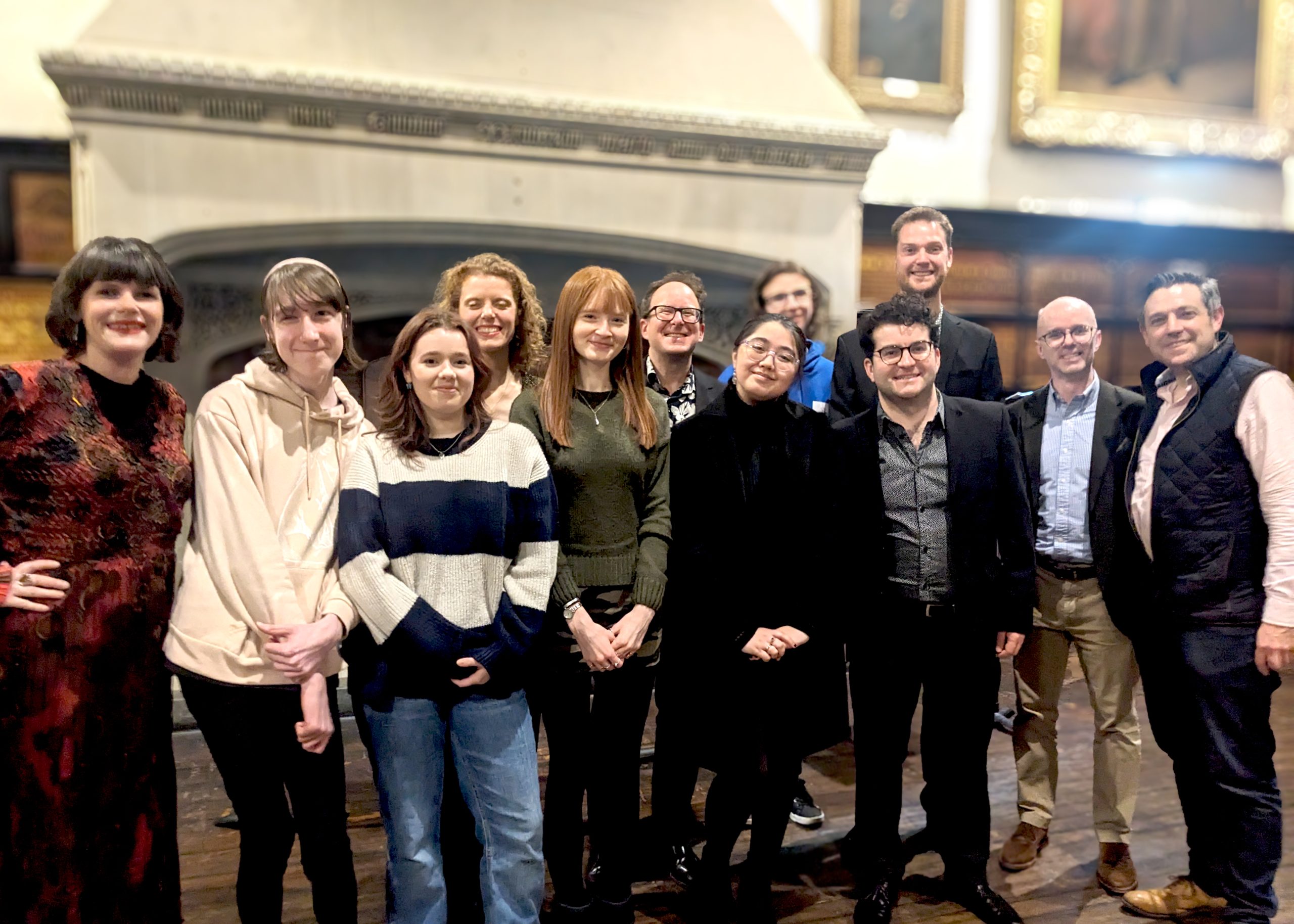One of the things I always enjoy about EXAUDI’s regular visits to Musicon is the way in which they cleverly blend very old and very new repertoire, with the strange harmonies of the Middle Ages sometimes sounding as alien as the avant-garde music that EXAUDI specialise in, joining up two ends of a circle across the centuries.
This concert in Durham Town Hall on the eve of St Valentine’s Day was subtitled ‘songs for loving and parting’ and at times the music was so intimate that this was not so much chamber music as bedchamber music. Two particularly poignant moments in the first half were the anonymous 14th century ‘Byrd one brere’, sung by bass Simon Whiteley to open the concert and Barbara Monk Feldman’s setting of Rilke’s poem ‘The Gentlest Chord’ sung by mezzo-soprano Lucy Goddard. Both singers drew us close to them with exquisitely tender singing, as did Hector Sequera with a Fancy for solo lute by John Dowland. The silence and stillness that these pieces elicited from the audience were magical.
Scaling up a little, soprano Emma Tring joined Lucy Goddard for Bennett Hogg’s ‘Song’, followed by tenor David de Winter with Simon Whitely for Guillaume de Machaut’s ‘Très douce dame’. Despite being written 600 years apart, the two pieces shared an intense level of communication between the two singers. Emma Tring and Lucy Goddard blended twisting lines that were vocally and harmonically miles apart, whilst in the Machaut, Simon Whitely kept up a wordless bass line that created a similar effect to a resonating string on a hurdy-gurdy.
The centrepiece of the concert was six short and remarkably accomplished pieces composed for the group by the upper-sixth A-level students at St Leonard’s, a Catholic comprehensive school in Durham. I was also struck by how different and individual each piece was, even though they were composing for the same forces and had been taught by the same teacher.
‘The dark between the stars’ by Jack Tait was harmonically complex and used the four voices very effectively to give the music a sense of cosmic scale. Holly Robson’s ‘buzz buzz’ had the playful feel of a madrigal, with intricate exchanges between the lines and fun vocalised buzzes for the bass. Kat Blakey took a Latin translation of ‘Now I lay me down to sleep’ in a gentle setting that was full of interesting details. Charlotte Curry chose Byron’s poem ‘When We Two Parted’ for her text, pushing the voices to their limits in bursts of colour, agonised harmonies and tumbling melodies. ‘crying for its nest’ by Eleanor Foreman was expressively sad, and full of longing with a tightly woven texture, which like Holly Robson’s piece reminded me of madrigals, but this time the heartbreaking Italian ones. The set finished with (now, let me get this right) 😍💞💞💅🍮 by Ty Thomas. According to the text, it means ‘I love sticky toffee pudding’. This piece sparkled with wit and invention – musical humour is a tricky thing to pull off effectively but this piece brought laughter from the audience and was a perfect ending to the first half.

In the interval, I was able to talk to staff and students and find out a bit more about this innovative project, which was initiated by Durham Music Service. Mike Summers, Manager of DMS explained that whilst the music service does a lot to support performance, they wanted to expand into exploring creativity and new music – another recent project has involved school musicians creating and performing a new piece with members of The Hallé.
Jack and Charlotte told me that they started work on their compositions after attending EXAUDI’s concert last year to get a feel for the group’s sound before choosing their texts. Charlotte said that the Byron poem had become one of her favourites after she studied it at GCSE and was she excited to explore it through composition. Although the six had feedback from EXAUDI’s director James Weeks, this evening was the first time they had heard the finished works being performed and they were clearly thrilled. Charlotte summed it up saying ‘it’s given me a huge boost of confidence in my piece’.
Matt Grehan-Bradley, head of music at St Leonard’s explained that if students can’t find perfomers for their compositions, they have to submit them as midi files, so being able to have recordings of a group of EXAUDI’s calibre bringing so much life to what were challenging pieces to sing, was another benefit of the project. St Leonard’s has been one of the schools worst hit by the RAAC debacle, and its pupils have suffered heartbreaking disruption to their education, so the fact that they have done such fine work is even more impressive given the circumstances.
The second half of the concert began with distantly placed singers, first a radiant performance by Emma Ting from a far corner of Hildegard of Bingen’s ‘O quam mirabilis est’ followed by the stereophonic effect of David de Winter and Simon Whitely singing John Cage’s wordless ‘Ear for EAR’ from behind us.
On more familiar aural ground, the programme led up to a set of songs for voices and lute by the great melancholist John Dowland. ‘His golden locks’ offered a gentle reflection on ageing, and I was beguiled by the sensuality of ‘Sweet stay awhile’. David de Winter and Hector Sequera gave us Dowland’s greatest hit, ‘Flow my tears’, in a performance that, well, flowed beautifully, never getting bogged down in the misery of tune or text, and with lovely contrasts of light and shade.
‘Flow my tears’ returned to end the concert, reimagined in Pelle Gudmundsen-Holmgreen’s intense and mesmerising ‘Song’. From the start, we sense Dowland’s music and words more than explicitly hearing it, as both are broken down into atomic fragments, including vocalised consonants that gradually crystallise into the familiar piece before petering out in a very moving ending.
Main image: St Leonard’s students, Matt Grehan-Bradley, Mike Summers, James Weeks and EXAUDI.







